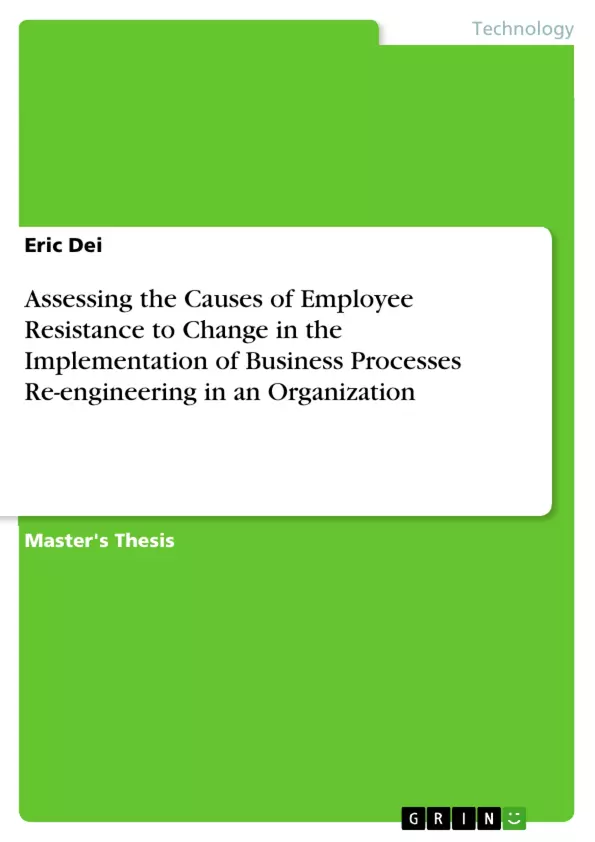The dynamism, especially in the Ghanaian market has forced players at all levels to consider competitive strategies such as business process re-engineering to rightly position them in the market. Also, the intense world-wide competition in today’s service industry motivates many companies to reengineer their old fashioned processes to achieve new heights of success. The study is therefore undertaken to investigate what could be the root cause employee resistance to change when deploying strategies such as Business process reengineering in Opportunity International Savings and Loans Ltd.
The study was designed as a quantitative survey, with questionnaires as the means of data gathering. Using the simple random sampling method, the study selected 300 respondents from OISL, out of a population of 750. The simple random sampling method was used to avoid bias in the sampling and ultimately, the results. The study used the SPSS and Microsoft Excel to analyse the data.
From the analyses of data, the study concluded that the principal causes of employee resistance were inadequate training, the perception that the change process is an imposition and the changes being inconvenient the daily routine of employees. In addition technical hitches and wrong timing leads to resistance to change. Using the ADKAR model, the study also concluded that employee involvement, communication and training are clearly the weaknesses of the change management methodology of the case study organization. The study also concluded that necessary support OISL management provide for employees during the implementation of business process re-engineering were far lower than the expectations of employees. The study therefore recommended that adequate training and development, democratization of the change process, better communication strategy to overcome resistance to change.
Table of Contents
- ABSTRACT
- LIST OF TABLES
- LIST OF ACRONYMS/ABBREVIATIONS
- CHAPTER ONE
- 1.0 INTRODUCTION
- 1.1 STATEMENT OF PROBLEM
- 1.2 OBJECTIVES OF THE STUDY
- 1.3 RESEARCH QUESTIONS
- 1.4 SIGNIFICANCE OF THE STUDY
- 1.5 OVERVIEW OF RESEARCH METHODOLOGY
- 1.6 SCOPE OF THE RESEARCH
- 1.7 LIMITATION OF THE RESEARCH
- 1.8 ORGANIZATION OF THE STUDY
- CHAPTER TWO LITERATURE REVIEW
- 2.0 INTRODUCTION
- 2.1 Concept and theoretical framework
- 2.2 Business process reengineering
- 2.3 Business Process Reengineering and Information Technology
- 2.4 Business Process Reengineering and causes of resistance to Change
- 2.5 BPR success/Failure factors
- 2.6. Resistance to change
- 2.7 Typology of change
Objectives and Key Themes
This research aims to explore the root causes of employee resistance to change during the implementation of business process re-engineering (BPR) in Opportunity International Savings and Loans Ltd (OISL) in Ghana. It seeks to identify the factors that contribute to this resistance and analyze their impact on the successful adoption of BPR. The study utilizes a quantitative survey approach to collect data from a sample of employees at OISL.
- Employee Resistance to Change
- Business Process Re-engineering (BPR)
- Change Management Strategies
- Organizational Culture and Resistance to Change
- Impact of BPR on Employee Performance
Chapter Summaries
Chapter One: Introduction introduces the research topic, providing context and background information on business process re-engineering and its potential for both success and failure. It outlines the research problem, objectives, research questions, significance, methodology, scope, limitations, and organization of the study.
Chapter Two: Literature Review presents a comprehensive review of relevant literature, exploring the theoretical frameworks and concepts related to business process re-engineering, change management, and the causes of resistance to change. It delves into BPR principles, success factors, failure factors, resistance to change, and different types of change.
Keywords
The study revolves around the key concepts of employee resistance to change, business process reengineering (BPR), organizational culture, change management strategies, quantitative research methodology, and employee performance.
Frequently Asked Questions
What causes employee resistance to change during BPR?
The main causes identified are inadequate training, the perception that change is an imposition, inconvenience to daily routines, technical hitches, and poor timing of implementation.
What is Business Process Re-engineering (BPR)?
BPR is a competitive strategy involving the fundamental redesign of core business processes to achieve dramatic improvements in productivity, cycle times, and quality.
How does the ADKAR model explain resistance?
The study uses ADKAR to show that weaknesses in communication, employee involvement, and training lead to a lack of awareness and desire for change among staff.
What role does Information Technology play in BPR?
IT is a critical enabler for BPR, providing the tools necessary to automate and streamline newly designed processes, though technical issues can also trigger employee resistance.
How can organizations overcome resistance to change?
Recommendations include democratizing the change process, providing adequate training and development, and implementing a better communication strategy to involve employees early on.
What was the focus of the OISL case study in Ghana?
The study focused on Opportunity International Savings and Loans Ltd to investigate why BPR implementation met with resistance and how management support compared to employee expectations.
- Quote paper
- Eric Dei (Author), 2014, Assessing the Causes of Employee Resistance to Change in the Implementation of Business Processes Re-engineering in an Organization, Munich, GRIN Verlag, https://www.grin.com/document/298959



